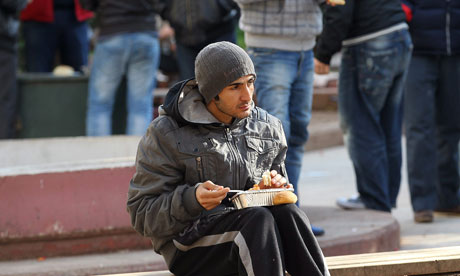Jon Henley visits Boroume which puts restaurants with unsold food at the end of each day in touch with soup kitchens
A young man eating outside a soup kitchen in Athens: it is estimated some 400,000 Greeks now visit a soup kitchen daily. Photograph: Orestis Panagiotou/EPA
It used to annoy Xenia Papastavrou, the way Greek tavernas always give you loads of bread, way more bread than you can eat. She started taking it home, just to avoid the waste. Then one night last year a waiter suggested she might as well take all that day's leftover bread away with her, and she had an idea.
"I thought, there must be lots of other restaurants in this situation, too," Papastavrou said. "And I was sure none of them knew where they could usefully give it. And at the same time, I knew there were many, many welfare organisations in this crisis that were spending good money on buying fresh bread. It just needed someone to put the two together."
Boroume – it means "we can" in Greek – was born last May in Papastavrou's living room. "I went first to the two bakeries nearest my home, and they were only too delighted to help," she said. "An average bakery could have as much as 30kg of unsold bread at the end of the day. I told a soup kitchen three minutes away, and they couldn't believe their luck."
A volunteer at Athens' Food Bank, Papastavrou promptly put her masters degree on hold and enlisted the help of friends to build a web platform on which companies with any kind of fresh surplus food could offer it, and welfare groups that needed it could accept. She started talking about the idea on Facebook and Twitter, and one of Greece's biggest newspapers, Kathimerini, wrote about it.
In under a year, the organisation has grown fast. Venetis, the country's largest chain of bakeries with more than 50 outlets, is one of 70 Boroume donors that now include the Athens Attica Hotel Association, fast-food chains, grocers and multinationals like IKEA. Private families around the country also donate, as do Greeks from the diaspora in Canada, Australia and the US.
A network of some 400 welfare organisations, from old people's homes and orphanages to drop-in centres for the homeless and church, voluntary and municipal soup kitchens, takes up the donations. Astonishingly, one in 11 residents of greater Athens – some 400,000 people – now visits a soup kitchen daily.
The group's Facebook page has 5,000 friends. A team of 15 volunteers man the website and phones, putting donors in touch with nearby recipients – to save time and resources, Boroume limits its role to that of intermediary. "We just put them in touch," said Papastavrou. "After that, they can deal directly with each other."
Round the corner from Boroume's cramped office (the organisation has been lent limited desk space by the language school Papatavrou's mother runs, but is looking for new premises) is the NVJ Athens Plaza hotel, a five-star edifice on Syntagma Square whose marble steps are regularly chipped and broken by rioters in search of ammunition.
Yesterday, the hotel's kitchens had prepared 50 meals of moussaka and chicken; staff were loading them into the boot of a car driven by a volunteer from the Galini soup kitchen around the corner, which supplies hot meals to 200 people daily. A few hundred yards away is Kyada, one of the city's largest municipal soup kitchens, feeding up to 1,400 people a day.
Earlier this winter, Boroume found six tonnes of potatoes for Kyada; they went in three days. "There is solidarity and sensitivity now," said Dimitra Nousi, who runs the facility. "It has surprised us. But it's a huge job. Years ago I was part of the team that prepared the Athens Olympics; until now, that was the biggest project the public administration had ever undertaken. But that was the glamour of wealth; now we're in the pain of crisis."
Boroume, meanwhile, is expanding beyond food. Welfare groups are asking for everything from clothing to cutlery; hotels have started donating furniture, fridges, televisions. Recently, a hairdresser went into a shelter for young girls and cut their hair, for free. This week someone offered a substantial quantity of heating oil.
People, said Papastavrou and Alexander Theodoridis, one of her co-organisers, "are beginning to fight back. It's a practical response, but also an emotional one. We feel the need to connect, to commit; that feeling got a bit lost in Greece of late. And it meets a need for the volunteers, too; several are jobless. Volunteering gives a sense of involvement."
Showing her Greek upbringing and past studies in ancient Greek and philosophy, Papastavrou said Socrates in Plato's Republic put it best: "A community starts to be formed, I suppose, when individual human beings find that they aren't self-sufficient, but that each of them has requirements which he can't fulfil on his own."
Greece on the breadline: how leftovers became a meal | World news | The Guardian
![The [Greek] European Tragedy](https://blogger.googleusercontent.com/img/b/R29vZ2xl/AVvXsEiWKI5s90SFm1wWTk6bs4p7CgslaC2SnYPsrZhb-B-smOufNNCSxCvpBLI9hOB-LsXZjir_PNmEiMk2-E62F3xkg96IoC6QFAaZAnPRTVH340IN9WBRmWJqPkjWlgyRj3zpALp7h6hvA58/s920/GkBack_new.jpg)
